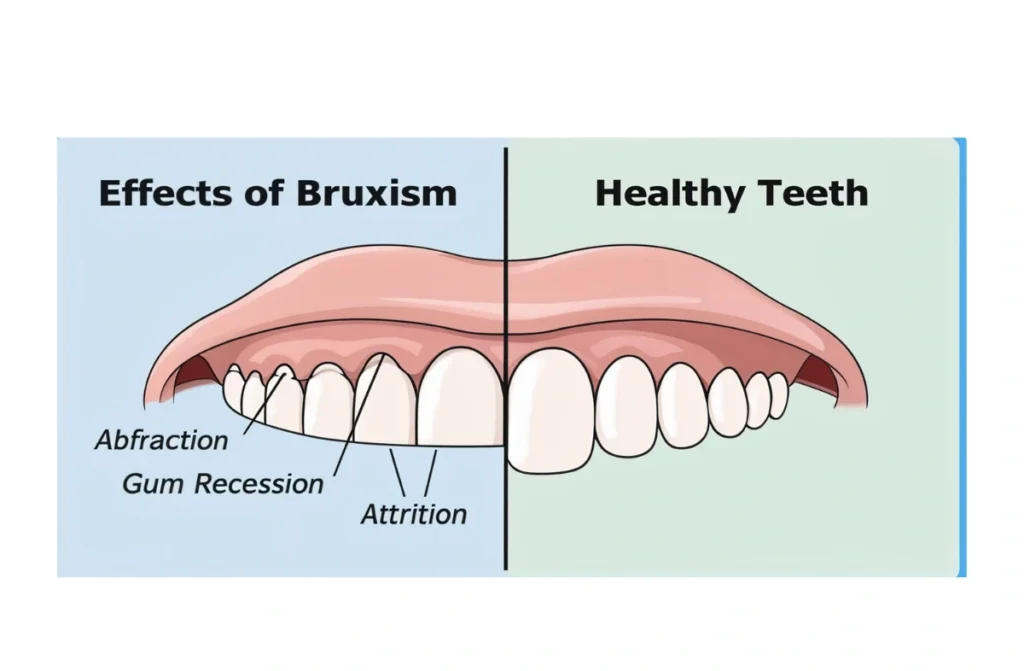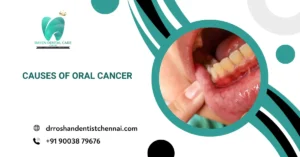Can stress cause tooth pain? Yes, and it’s more common than many people realize. Tooth pain is usually blamed on cavities, infections, or gum disease—but sometimes, the real culprit is emotional stress. When you’re overwhelmed or anxious, your body responds in physical ways: clenching your jaw, grinding your teeth, or even reducing saliva. These subtle changes can lead to inflammation, sensitivity, and a throbbing ache that feels like a dental issue. Recognizing this connection is the first step to protecting both your mental and oral health.
How Can Tooth Pain Be Caused By Stress?
| Cause | Explanation |
| Jaw Clenching & Teeth Grinding | Stress often leads to unconscious clenching or nighttime grinding (bruxism), wearing down enamel and straining the jaw. This can trigger tooth pain stress anxiety symptoms and even cause fractures. |
| Facial Muscle Tension | Emotional tension tightens facial muscles, especially around the jaw. This strain can mimic toothaches, even when the teeth are healthy, showing how tooth pain stress anxiety may not have a physical origin. |
| Inflammation & Immune Response | Chronic stress increases inflammation and weakens immune function, affecting gums and nerve endings. This highlights how stress affects your oral health internally and increases pain. |
| Heightened Pain Perception | Anxiety alters how the brain processes pain, making mild sensations feel intense. So yes, can stress cause tooth pain? Absolutely—by exaggerating normal stimuli. |
| Neglect of Oral Hygiene | During stressful times, oral care routines may slip, causing plaque buildup and gum irritation. This behavioral response illustrates how stress affects your oral health through daily habits. |
| Psychosomatic Pain Response | Some pain is stress-induced, with no physical cause in the mouth. This is known as psychosomatic pain and confirms that can stress cause tooth pain even when no dental issue exists. |

What Is the Relationship Between Stress and Toothache?
Many people underestimate the link between emotional tension and oral pain, but science proves it’s real. Stress doesn’t just affect your mind — it can manifest physically, leading to jaw tension, muscle soreness, and even dental pain. Understanding How Stress Affects Your Oral Health can help prevent long-term complications and maintain both mental and oral well-being.
- Muscle Tension and Teeth Grinding: Chronic stress often leads to teeth clenching or grinding (bruxism), especially during sleep. This habit puts pressure on the jaw and enamel, causing tooth sensitivity and pain. People wondering, Can Stress Cause Tooth Pain, should know that constant tension in facial muscles directly contributes to jaw soreness and dull, persistent aches.
- Inflammation and Gum Sensitivity: When you’re stressed, your immune response weakens, increasing inflammation throughout the body. This can make gums more sensitive, red, and prone to bleeding. As a result, Tooth pain stress anxiety becomes a cycle — stress worsens oral inflammation, and oral pain triggers more stress.
- Psychosomatic Tooth Pain: Some individuals experience Psychosomatic tooth pain, where emotional distress mimics physical toothache even without a dental issue. The brain interprets emotional pain as physical discomfort, creating a genuine sensation of aching teeth. Managing emotional stress often helps relieve such phantom tooth pain.
- Hormonal and Saliva Changes: Stress hormones like cortisol reduce saliva production, leading to dry mouth. Lack of moisture increases bacterial growth, decay, and bad breath. Understanding How Stress Affects Your Oral Health includes recognizing how hormone fluctuations make your mouth more prone to cavities and discomfort.
- Weakened Healing and Oral Defenses: Prolonged anxiety slows the body’s healing capacity, delaying recovery from dental issues or gum infections. Stress also affects blood flow and nutrient delivery to oral tissues, compounding discomfort and increasing vulnerability to pain. Managing Tooth pain stress anxiety through relaxation techniques or therapy can significantly improve oral resilience.
- Behavioral Habits That Worsen Pain: Under stress, people may neglect brushing, skip dental routines, or consume more sugary snacks and caffeine. These habits erode enamel and worsen sensitivity. Addressing Can Stress Cause Tooth Pain involves balancing emotional control with consistent oral care and mindful daily habits.
Treatment options for anxiety-induced tooth pain
Anxiety-induced toothaches are more than just physical discomfort—they’re signals from your body that stress is taking a toll on your oral health. When exploring solutions, it’s important to address both the emotional triggers and the dental symptoms. Here are effective treatment approaches that target both sides of the problem:
- Use of a Custom Night Guard: For individuals who grind their teeth at night—a condition known as bruxism—a custom-fitted mouthguard can protect enamel and reduce pressure on the jaw. This helps prevent damage and eases symptoms of tooth pain stress anxiety by minimizing nighttime clenching.
- Cognitive Behavioral Therapy (CBT): CBT helps manage anxiety by identifying and changing negative thought patterns. As stress decreases, physical symptoms like jaw clenching and tension-related aches also reduce, showing that yes, can stress cause tooth pain—especially when anxiety goes untreated.
- Stress Management Techniques: Incorporating activities like yoga, deep breathing, and guided meditation can lower cortisol levels and ease muscle tension in the jaw and face. These practices not only relieve psychological stress but also reduce the chance of tooth pain stress anxiety becoming a chronic issue.
- Maintaining a Strict Oral Hygiene Routine: Even during stressful periods, brushing twice daily and flossing keeps your teeth and gums healthy. Neglecting oral care can amplify inflammation and discomfort, particularly if stress already has your immune system and nerves on edge—proving again how closely can stress cause tooth pain.
How To Prevent Stress-Related Toothaches
- Use a Night Guard: If you’re grinding, a mouthguard can protect your teeth from damage and ease jaw tension.
- Stay on Top of Your Routine: Even during stressful times, brushing twice a day and flossing once is crucial. This helps prevent minor issues from becoming painful problems.
- Practice Mindfulness: Stress reduction practices—like deep breathing, yoga, or journaling—can lower cortisol and reduce clenching. These small habits are big players in how stress affects your oral health.
- Recognize the Signs: Sore jaw in the morning? No visible dental issues but throbbing pain? These may be tooth pain stress anxiety indicators—worth paying attention to.
When Should You Contact a Dentist for Tooth Pain?
Toothaches can range from mild irritation to intense, persistent pain—but knowing when to seek professional help is essential. While occasional discomfort might be linked to stress or tension, prolonged or unexplained pain should never be ignored. Even if it seems like tooth pain stress anxiety, a proper dental exam can uncover hidden issues.
- Pain Lasting More Than Two Days: If your toothache doesn’t go away within 48 hours, it’s time to see a dentist. Persistent pain might indicate infection, decay, or even psychosomatic tooth pain, where emotional stress is causing physical symptoms.
- Swelling or Bleeding Gums: Gums that appear red, puffy, or bleed during brushing may signal gum disease, not just tooth pain stress anxiety. These symptoms can worsen over time, affecting the bones that support your teeth if not treated.
- Sharp Pain When Biting or Chewing: Sudden pain during eating might point to a cracked tooth or deep cavity. While it could feel like psychosomatic tooth pain, only a dentist can confirm whether the issue is structural or stress-related.
- Unexplained Sensitivity to Hot or Cold: Sensitivity might stem from enamel erosion or exposed nerves. It’s also a common symptom reported in tooth pain stress anxiety cases, so a dentist can help distinguish between physical wear and stress-induced symptoms.
- Pain with No Visible Dental Cause: If you’re experiencing a constant ache but your teeth appear healthy, this might be psychosomatic tooth pain triggered by emotional stress. Still, a dentist’s evaluation is crucial to rule out subtle issues and guide treatment properly.
Ignoring ongoing symptoms may lead to more serious complications. Whether the pain is physical, emotional, or a mix of both, your dentist can help find the cause and protect your long-term oral health.
Conclusion
Can stress cause tooth pain? Yes, and it happens more often than you might think. Your body often gives small signals before bigger problems show up, and sometimes those signals come through your teeth. If your teeth hurt and you’re feeling stressed, it could be connected. Paying attention to these signs can help you take care of both your mind and your mouth. Remember, your health is all connected—and your smile tells part of that story.
Read also: Emergency Dentistry




